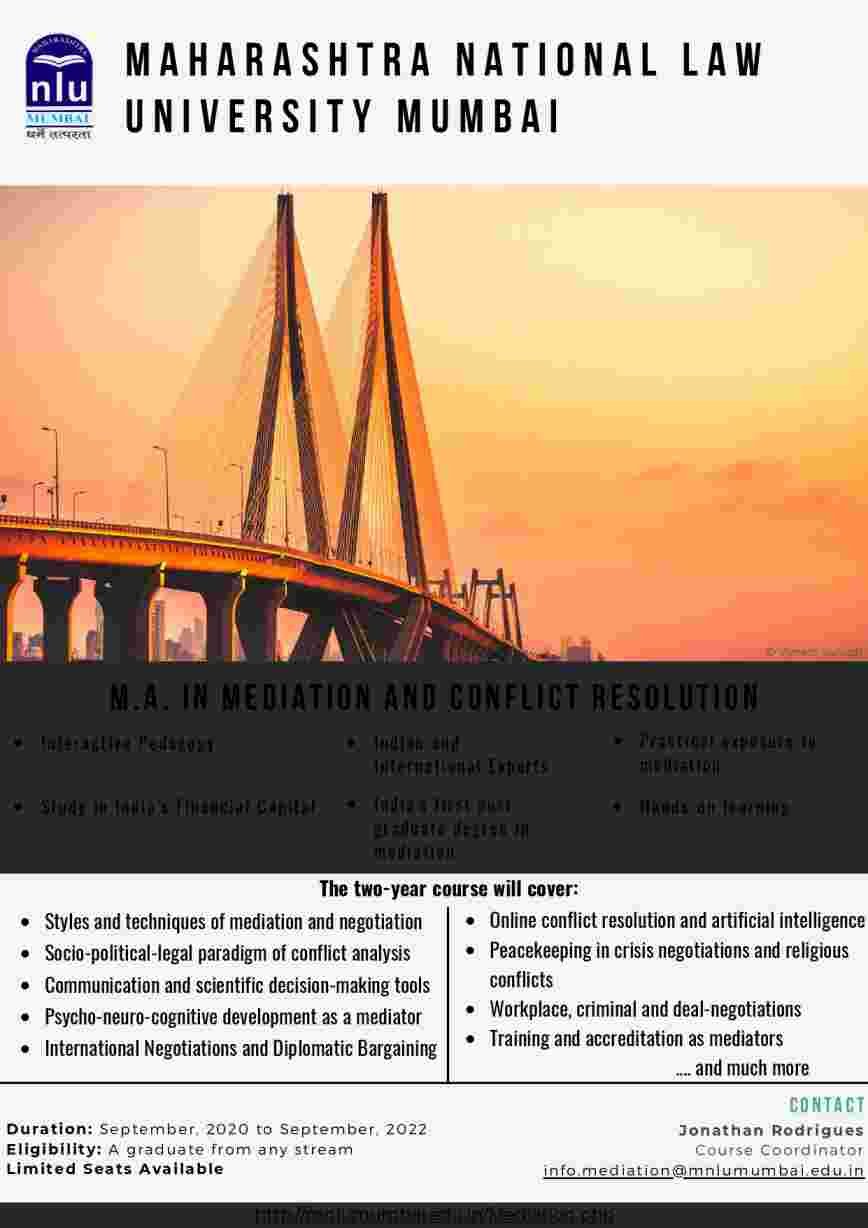About the programme: MNLU
MNLU: The concepts of Mediation are inspired by learnings from multiple disciplines, such as law, psychology, commerce, sociology, political science, neuro-biology, economics, history, etc. The two-year masters course will introduce participants to various theories of Mediation and their applications in the real-world. With 16-odd modules, spread across four semesters, participants will be exposed to modern trends and model teachings from Indian and International schools of research and practice.
Participants will be acquainted and trained in the basics of mediation, specialized negotiation skills, effective communication tools, diplomatic strategizing, advanced online tools, and restorative facilitation techniques. The course will also explore the socio-political-legal paradigm of conflict, look at conflict resolution from a religious lens and discuss the psycho-neuro-cognitive development of a conflict resolution professional.
Pedagogy: M.A. Mediation and Conflict Resolution
The course is designed to be taught in an interactive environment using various technological and human resources, such as lectures, group discussions, mediation simulations, online presentations and audio-visual tools. The participative nature of the course will also be followed in it examination structure via role-play evaluations, stone-soup analysis, case studies, reflective journals and personalized feedback.
Besides essays and objective criteria tests, participants will also be examined on research and writing techniques, and will experience real-life mediation while shadowing professional mediators during internships. Classes will be held for a week every month, and the rest of the month be allotted for study and assignments. The faculty for the programme will include experienced practitioners and academicians from India and abroad.
Eligibility: MNLU
The post-graduate programme in Mediation and Conflict Resolution is open to graduates from all disciplines.
Course Structure
| FIRST SEMESTER | THIRD SEMESTER |
|---|---|
| Paper 1 – Mediator Training Paper 2 – Philosophical Roots of Mediation and Conciliation Paper 3 – Models of Mediation Paper 4 – Research Study of Dispute Resolution Institutions in India | Paper 9 – Indian Studies in Dialogue and Conflict Resolution Paper 10- Conflict Analysis in the Modern Socio-Political-Legal Paradigm Paper 11 – Psychological and Cognitive Understanding of Conflict Paper 12 – Psycho-Neuro-Cognitive Development of a Conflict Resolver |
| SECOND SEMESTER | FOURTH SEMESTER |
|---|---|
| Paper 5 – Scientific Approach towards Decision-making Paper 6 – Specific Negotiations I – International Negotiations and Diplomatic Bargaining Paper 7 – Specific Negotiations II – Business, workplace, criminal and community Paper 8 – Observational and Reflective Practice (Internship) | Paper 13 – Legal Status of Mediation: A Global Perspective Paper 14 – Future of Mediation – ODR & Artificial Intelligence Paper 15 – Conflict Resolution: The Religious Lens Paper 16 – Restorative Justice |
Note: Papers may be swapped between the semesters. However, they will not be cancelled from the curriculum.
Abstract of Course Modules: Click Here.
Career Prospects
The MA in Mediation and Conflict Resolution is introduced to equip working professionals with an ammunition of skills and knowledge in the world of dispute resolution, as conflict is an inevitable element of our work culture. Besides mastering practical skills, and developing academic insights on the theory, successful post-graduates will also own the title of ‘accredited mediator’, recognized to practice privately and in court-affiliated mediation centers in India.
Course Coordinators: MNLU
- Mr. Jonathan Rodrigues, Lawyer & Accredited Mediator | LL.M, University of Strathclyde | TEDx Speaker
- Mr. Chirag Balyan, Assistant Professor of Law, Maharashtra National Law University Mumbai (MNLU)
Contact Details
Jonathan Rodrigues: Course Coordinator
You may write to us at info.mediation@mnlumumbai.edu.in.
Note: Admission details will be posted soon. Keep visiting this page for regular updates.


